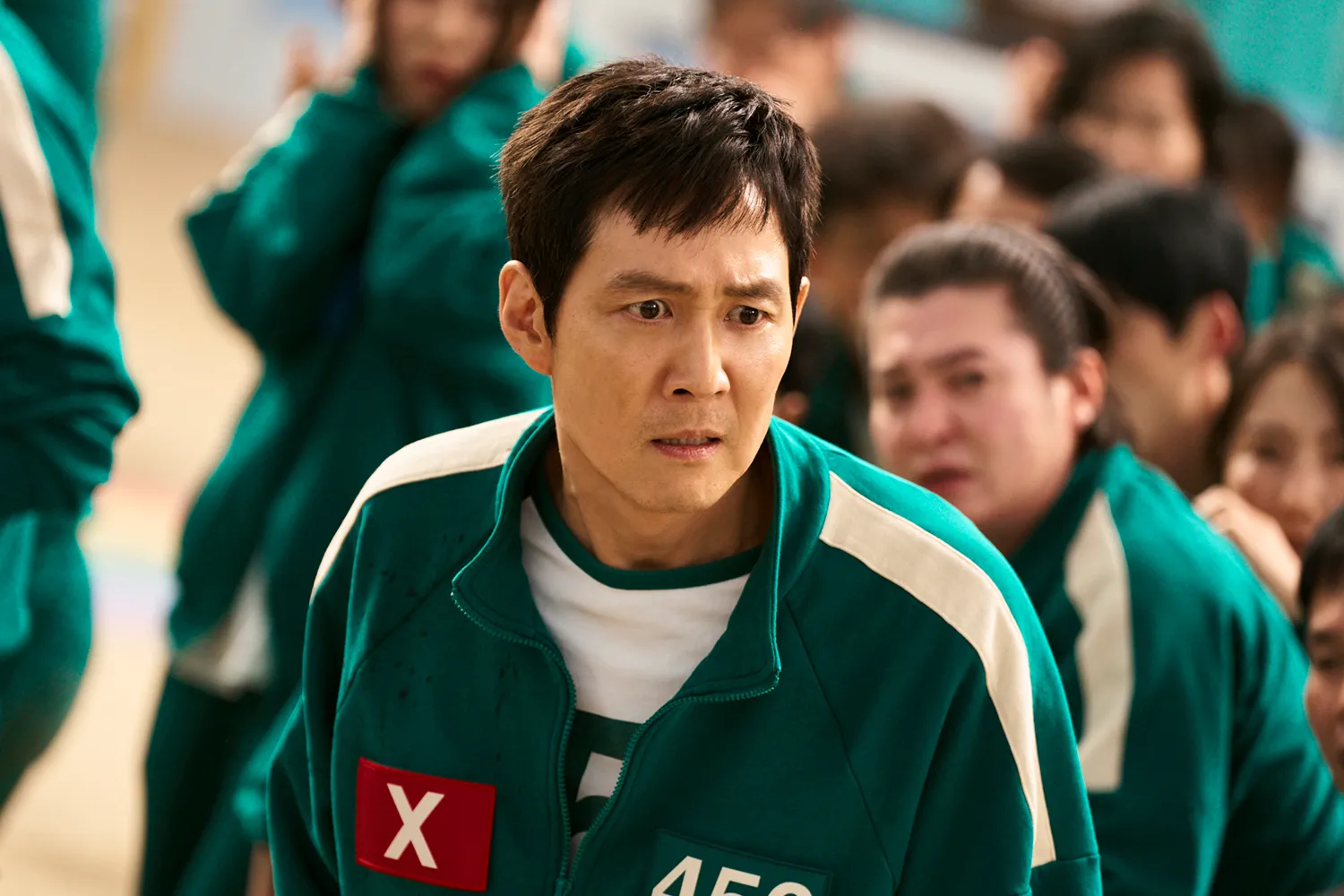In midtown Manhattan, a few steps from Madison Square Garden, Macy’s, and the Empire State Building, there’s a space where rotating tourist traps set up camp. Some years ago, I took my young niece to something called “Candytopia,” and while we certainly overdid it on the gummy worms, it was a wholesome afternoon. Today, however, visitors of all ages line up for “Squid Game: The Experience,” where they take selfies and recreate moments from one of the most vicious, violent, and arguably nihilistic works of popular entertainment ever made.
Squid Game, which you have almost certainly either watched or heard about by now, is the South Korean television series produced and distributed by Netflix that became an international phenomenon in 2021. How international? Well, in addition to New York City there are “experience” locations in London, Sydney, and Seoul. (One in Madrid just closed.) How much of a phenomenon? The addictive, gruesome, distressing, extremely far-fetched but also weirdly emotional series is the most-viewed piece of “content” (the industry term) on Netflix, with a staggering 3.585 billion hours of the show’s two seasons viewed around the world, according to Netflix’s own reporting. A third and final season premieres on June 27.

Since Squid Game’s characters are frequently crunching large abstract numbers, it’s appropriate to point out that that’s over 409,000 years of time devoted to this thing—and that total is about to skyrocket with the release of the new season.
Judging a show’s success this way may seem a bit strange, but less so if you’ve seen it. Squid Game is a story about measurements—weighing the odds against a difficult challenge, keeping one step ahead of strings-attached debt, rationalizing just how much of one’s humanity you can dissolve to make yourself solvent.
Another way to acknowledge this show’s success: Go to any search engine and type in the number 45.6—if you have autocomplete turned on, I bet you it fills in “45.6 billion won to USD.” That’s the top prize available to the Squid Game participants, and that so many people have looked up this number already surely has to represent something. I can also tell you that, in preparation for this piece, I binge-watched the show over the course of 48 hours and had nightmares both nights!
To briefly summarize the story, Squid Game is set in modern South Korea and features an array of characters in rough financial straits for a variety of reasons. Our main character, Seong Gi-hun (Lee Jung-jae), has a gambling addiction made worse by his guilt about being a bad father (he forgets his daughter’s birthday) and bad son (he steals from his hardworking mother so he can go to, and lose at, an off-track betting parlor).

When it looks as if he won’t keep his loan sharks away for another moment, he is recruited in a subway station. A friendly chap invites Gi-hun to play a children’s game (ddakji) that involves flipping over pieces of brightly colored folded paper. Gi-hun wins a few bucks. Later, when he realizes that he will lose visiting privileges with his kid if he doesn’t secure more money, he calls the number on a mysterious business card to play more kiddie games for cash.
In time, he is knocked unconscious by gas and brought to a secret island, where 455 other desperate people are penned up and eager to see if they, too, can reverse their fortunes. They quickly sign some legal documents (always read the fine print!) and are led by eerie guards in red jumpsuits with masks through a candy-colored M.C. Escher-like staircase, then to a René Magritte-like indoor-outdoor setting to play the recess classic “red light, green light.”
The PA system announces that those who move even an inch after “red light” is called will be eliminated. We soon learn that “eliminated” means being shot by snipers.
Following a sickening display of bloodshed—instinct leads many to run away, even though this means they’ll get gunned down—Squid Game makes its first of many brilliant turns. After seeing how much the pot has increased with so many eliminated players, remaining contestants are allowed to vote on whether the game should continue. Though it is a close vote, they choose to end it. And then, after everyone returns to their wretched lives, they slowly realize they must go back. The lure of that lucre is too great, and their situations in real life are too dire.
As the series settles in, people begin to make alliances; heroes and villains emerge; there are shocking reversals, moments of absolute terror, and a string of ethical dilemmas that make the trolley problem look simple. (Determining when it is right to make a preemptive strike, perhaps sacrificing some to save many, is just one philosophical conundrum.) In time we learn who set this diabolical scenario up in the first place, and get a glimpse at the grotesque “VIPs,” an international cabal of perverts who place bets and delight in watching others suffer.
Unlike most television shows, Squid Game is truly the work of an auteur, with every episode written and directed by its creator, 54-year-old Hwang Dong-hyuk. Like the main character in the show, Hwang was born and raised in the working-class Seoul neighborhood Ssangmun-dong. And like the show’s first season villain, he attended Seoul National University. He later studied filmmaking at the University of Southern California, and after making some well-received short films, he found himself accruing a great deal of debt.
At the time, he read the manga Battle Royale (also made into a film), in which junior high-aged kids are knocked unconscious by gas and brought to a secret island where they must fight one another to the death. Inspired by the idea, he wrote Squid Game as a script for a feature film but failed to find financing. He made other successful movies instead, and when Netflix began rooting around South Korea looking for things to produce after pop acts like BTS and Blackpink became international sensations—and just as Bong Joon-ho’s class-conscious crime drama Parasite was nearing its best picture win at the Oscars—he struck a deal to turn it into a series.

Exactly why South Korean cultural exports are so popular is a bit of a mystery, but the trend does not appear to be slowing down. One thing that strikes me as an outsider, judging mostly by what I’ve seen in movies and television, is that life there seems to be one of great extremes. (Stark wealth inequality is the central premise of Parasite, for example.)
South Korea is a powerhouse of entertainment, much of it sunny and alluring, but there is an alarming rate of suicide among the country’s celebrity class. It also has the world’s lowest birth rate, and a trend of disinterest—if not outright hostility—to marriage among women. There is a striking problem of online videos radicalizing a far right—something that’s certainly felt all over the world, but seems to have really taken root there.
The recent impeachment of President Yoon Suk-yeol may hopefully restore some calm following a period of martial law, but it will likely take some time. In a novel move, over 100 South Korean citizens are suing the former president for emotional damages now that he’s out of office. (Should he find himself in serious debt as a result, well, I think we all just discovered what Squid Game’s fourth season should be about.)
I don’t think South Korea is fundamentally any different from, say, the United States, but I do think, perhaps due to its smaller size, or its more recent economic development, things there may just be a little bit more intense.
That intensity is what comes through in Squid Game, a show that is (one can never state firmly enough) absolutely ludicrous, but perfect for the at-home binge watch. If nothing else, the game sequences are tremendously clever, and once you start to like individual players, you find yourself extremely caught up in who will advance to the next level and who will be mowed down by close-range machine-gun fire.

To enjoy the show, you need to do two things: First, absolve yourself of any self-condemnatory feelings. “No,” you must conclude, “I am not a sociopath for having a good time watching people languish in psychological torment.” Squid Game, one can rationalize, is satire—or at least an anti-capitalist statement—in addition to a buffet for gorehounds who like to see how bodies contort but people still gurgle in agony after they fall on hard ground from several stories.
Second: You must suspend your disbelief more than with most shows. Just how this secret island with its weird masks and international parade of voyeuristic sickos got built is never really explained, and if it tried, I’m sure the attempt would be poppycock.
But just how far-fetched is the general principle, really? During the Great Depression, ballrooms regularly hosted “dance marathons” in which out-of-work people exhausted themselves for the amusement of gawking audiences and the dream of a cash reward. It wasn’t quite as brutal as the Roman Colosseum, but certainly had commonalities.
The strangest twist to the Squid Game phenomenon is served straight to you, care of the Netflix algorithm, once you’ve exhausted the series. British reality television producers recently created Squid Game: The Challenge, in which people from around the world compete in many of the same games as in the original, with a huge wad of cash waiting for the winner.
No one is actually killed, of course. But the fact that so many people watched this outrageously violent and bleak show and said “OK, I’ll try!” might be representative of a weird and foreboding turn in our culture. Lord knows what’s coming after Season 3.

What to watch after Squid Game
Battle Royale (2000), dir. Kinji Fukasaku – An ultraviolet (though creative) kill-fest where school kids are forced to slaughter one another in order to survive.
The Hunger Games (2012), dir. Gary Ross – A much toned-down version of Battle Royale, but with significant world-building and some lavish production design that is mirrored somewhat in the childlike interiors of Squid Game.
The Most Dangerous Game (1932), dirs. Ernest B. Schoedsack and Irving Pichel – Joel McCrea and Fay Wray co-star as shipwreck survivors who realize they are being hunted for sport on a private island.
Hard Target (1993), dir. John Woo – What if The Most Dangerous Game starred Jean-Claude Van Damme?
They Shoot Horses, Don’t They? (1969), dir. Sydney Pollack – Jane Fonda leads a cast of desperate people grimly hobbling around and around in a Depression-era “dance marathon,” a depraved form of gladiatorial entertainment my own grandparents witnessed on the Jersey Shore decades before I was born.
Snowpiercer (2013), dir. Bong Joon-ho – An action-drama from the director of Parasite set on a rather symbolic train divided by class.
I Saw the Devil (2010), dir. Kim Jee-woon – Squid Game’s Lee Byung-hun (featured more prominently in Season 2) co-stars in this crafty and elaborate cat-and-mouse game that features some of the most innovative ways for one person to kill another I’ve ever seen. A somewhat sickening movie, but its creativity was surely an influence on Hwang Dong-hyuk.
I Declare War (2012), dirs. Jason Lapeyre and Robert Wilson – This low-budget Canadian film treats kids playing “Capture the Flag” in the woods with the deadly seriousness (and film grammar) of an actual war. It rhymes nicely with the life-or-death stakes of the children’s games in Squid Game.
Salò, or the 120 Days of Sodom (1975), dir. Pier Paolo Pasolini – One of the most controversial movies ever made, Salò is either a trenchant reflection on man’s lust for cruel voyeurism or an exercise in cruel voyeurism itself. (I remain unsure myself.) Sequences of Squid Game’s VIPs seem to be direct homages to the perverted fascists of the film.
Squid Game: The Challenge (2023) – You at least need to see how they do the “Glass Bridge” game in real life.
The post Why Is ‘Squid Game’ So Popular? appeared first on Foreign Policy.




